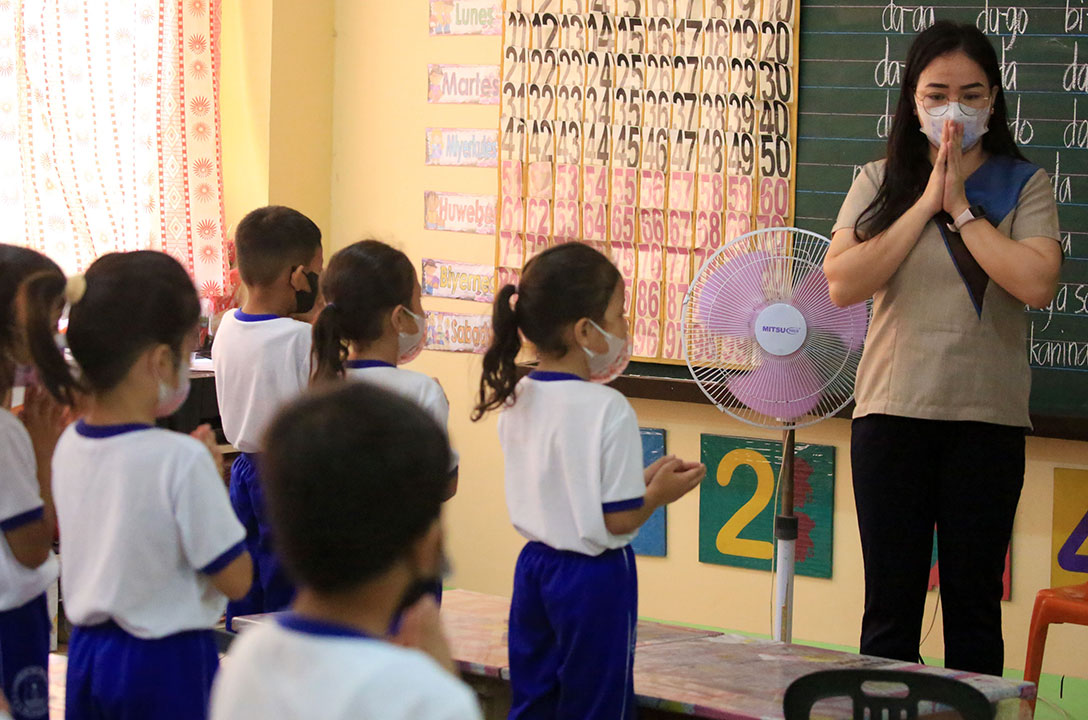
Corporate Watch
By Amelia H. C. Ylagan

The 1986 EDSA People Power Revolution was the declaration of independence from the 14-year dictatorship of Ferdinand Marcos, Sr. and the Filipinos’ renewal of vows for moral uprightness in “life, liberty and the pursuit of happiness,” as embodied in the constitutions of democratic nations.
Corazon “Cory” C. Aquino, widow of the assassinated oppositionist Senator Benigno Aquino, Jr. whose death on Aug. 21, 1983 raised the groundswell for protest and revolution against Marcos’ martial law, was president of the revolutionary government after EDSA I, and subsequently president of the Republic under the new Constitution of 1987.
The preamble of the Philippine Constitution of 1987 reads:
“We, the sovereign Filipino people, imploring the aid of Almighty God, in order to build a just and humane society, and establish a Government that shall embody our ideals and aspirations, promote the common good, conserve and develop our patrimony, and secure to ourselves and our posterity, the blessings of independence and democracy under the rule of law and a regime of truth, justice, freedom, love, equality, and peace, do ordain and promulgate this Constitution.”
Article XIV, Sec. 3 directs that:
“All educational institutions shall include the study of the Constitution as part of the curricula.
“They shall inculcate patriotism and nationalism, foster love of humanity, respect for human rights, appreciation of the role of national heroes in the historical development of the country, teach the rights and duties of citizenship, strengthen ethical and spiritual values, develop moral character and personal discipline, encourage critical and creative thinking, broaden scientific and technological knowledge, and promote vocational efficiency.”
Based on the mandate of the 1987 Constitution, Cory Aquino directed the Department of Education, Culture and Sports (DECS) to develop the framework for the implementation of values education programs in the three levels of education: elementary, secondary, and tertiary.
“The changes brought about by the peaceful revolution of 1986, the new expectations for real freedom and democracy, and the emergence of opportunities for the citizens to participate in social transformation and nation building all demand a corresponding re-assessment in the values, the attitudes, and the behaviors of the people. To meet this challenge, the DECS has embarked on a vigorous program of values education designed to enhance human development and strengthen the moral fiber of the people through the educational experience” (DECS Order No. 6, s. 1988).
Values Education was thus institutionalized since 1988 as an educational thrust in all the levels of Philippine education. The new secondary school curriculum was implemented starting school year 1989-1990 and introduced Values Education as a separate subject, while values development was also integrated in all the other subjects in the curriculum.
The Moral Recovery Program that Cory Aquino initiated and implemented “in order to eradicate the social ills that have plagued us for the past several decades, such as graft and corruption, patronage politics, apathy, passivity, mendicancy, factionalism and lack of patriotism” was formally installed by Proclamation No. 62 signed by Aquino’s successor, President Fidel V. Ramos, on Sept. 20, 1992 in the first quarter of the first year of his term as president. The Moral Recovery Program of 1992 envisioned “moral recovery is an integral aspect in ensuring success in the government’s economic development and people empowerment programs and projects” and reminded that “there is a need to prepare the youth to respond to the challenges of modernization and the 21st century.” Thus was the Values Education program re-validated and continued under the Moral Recovery Program of 1992.
However, momentum to moral recovery was broken when Joseph Ejercito Estrada (elected president and installed June 30, 1998), was accused and publicly investigated in October 2000 by committees of Congress for receiving payoffs from the illegal “jueteng” gambling syndicates and owning property and unexplained wealth allegedly from corruption and influence. The investigations continued, leading to an aborted impeachment trial in January 2001. Thousands of people took to EDSA for three days and protested like at the 1986 People Power Revolution, until the Armed Forces of the Philippines (AFP) led by Chief of Staff Gen. Angelo Reyes withdrew support for Estrada on Jan. 19, 2001. The Supreme Court declared the presidency vacant, saying that Estrada had resigned the office. Vice-President Gloria Macapagal Arroyo was sworn in as president, to serve Estrada’s unexpired term of three remaining years.
With such a tenuous environment for a sustainable moral recovery program, the focus on values education in schools was perhaps sensitive and embarrassing for the new government. Still, the Senate and House of Representatives jointly crafted Republic Act No. 9155: “An act instituting a framework of governance for basic education, establishing authority and accountability, renaming the Department of Education, Culture and Sports (DECS) as the Department of Education (DepEd), and for other purposes.” This lapsed into law on Aug. 11, 2001 without the President’s signature, pursuant to Sec. 27(1), Article VI of the Constitution.
Gloria Arroyo’s nine-year presidency was marred by public accusations and Congressional investigations of graft and corruption, including the infamous “Hello Garci” tapes where she was supposed to have arranged with a high-ranking Commission on Elections (Comelec) officer for her winning in the 2004 presidential elections. In 2005, 2006, 2007, and 2008, impeachment complaints were filed against her, although none of these thrived because of the lack of opposition numbers in the Legislature. Before the end of her term in 2009, Gloria Arroyo granted executive pardons to convicts Joseph Estrada (plunder); Claudio Teehankee, Jr. (murder); Romeo Jalosjos (rape); and 11 persons convicted of involvement in the assassination of Benigno Aquino, Jr. (Arroyo would later be pardoned herself by President Rodrigo Duterte for graft and corruption and electoral sabotage cases filed against her in the courts and the Sandiganbayan.)
Benigno Simeon “PNoy” Aquino III, who was elected president after Gloria Arroyo in 2010, vowed to bring back the Moral Recovery Program of his mother, Cory Aquino. A basic step forward was an upgrade of education with the adoption of Senate Bill No. 3286/House Bill No. 6643 in DepEd Order No. 31 s. 2012, entitled “Policy Guidelines on the Implementation of Grades 1 to 10 of the K to 12 Basic Education Program (BEP)” effective school year 2012-2013, with the centerpiece ‘Edukasyon sa Pagpapakatao’ (EsP), or Values Education that ‘teaches grade school pupils and high school students character education, moral values and ethics.’” Implementing Rules and Regulations (IRR) were signed on Sept. 4, 2013. The EsP curriculum was faithfully adhered to by Basic Education schools, both public and private.
When Rodrigo Duterte assumed the presidency after Aquino III in June 2016, his personal style and demeanor might have been considered counter-indicative to the “Pagpapakatao” or dignity and honor ingrained in the people after the noble victory of the peaceful, bloodless 1986 EDSA Revolution. An Inquirer article said, “Known for being-foul-mouthed, President Rodrigo Duterte has defended his cursing in public, saying it is not a crime” (inquirer.net April 24, 2019). Still, the “Bawal Bastos” or Republic Act No. 11313, “The Safe Spaces Act” was signed by Duterte on April 17, 2019, penalizing a range of acts of sexual harassment including catcalling, wolf-whistling, and persistent telling of sexual jokes in public areas such as streets, privately owned places open to the public, and public utility vehicles, among others. The law extends to cyberspace and expands the first Anti-Sexual Harassment Act, or the Republic Act 7877 of 1995.
“Public officials from the President down should lead by example and show proper manners, in both word and deed,” an editorial of the Philippine Star said (July 4, 2020).
On June 25, 2020, Duterte had signed Republic Act No. 11476, the “GMRC and Values Education Act: An Act institutionalizing good manners and right conduct and values education in the K to 12 curriculum, appropriating funds therefor, and for other purposes.” This replaced the Edukasyon sa Pagpapakatao curriculum. But a check with the DepEd confirmed that up to now, the Implementing Rules and Regulations (IRR) for the GMRC-Values Education Act have yet to be finalized and released to the public.
How long must we wait for moral recovery in our country? Values Education for our children would give hope for a better future.
Amelia H. C. Ylagan is a doctor of Business Administration from the University of the Philippines.